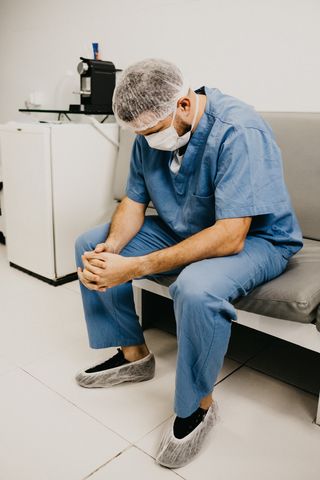Health
Lessons From the 2003 SARS Outbreak
Interview with Dr. Antoinette Lee on tending to medical workers' mental health.
Posted April 9, 2020

The impact of COVID-19 only seems to be growing, reaching far and wide across the globe. However, as we figure out steps forward, we must not forget the health workers on the front lines. The physical safety of these pandemic workers is crucial, but so is their mental health.
Dr. Antoinette Lee is an honorary assistant professor at the Department of Psychology at the University of Hong Kong. She is an academic health psychologist. Her research focuses on the interface between psychology and medicine, including how medical conditions affect mental health and how psychological factors impact physical health. She has over 50 publications in peer-reviewed international journals and has delivered lectures and conference presentations in different places around the world.
JA: How did you first get interested in this topic?
AL: During an infectious disease outbreak when lives are at stake, everyone’s focus is on physical health and public health—the mental health impact tends to be overlooked. However, from the increased rates of emotional distress and maladaptive behaviours such as panic-buying in society, it is apparent that epidemics have significant impacts on mental well-being as well.
One group that is particularly affected is health care workers. They are at the forefront fighting the outbreak on a daily basis, which presents enormous stress and challenges. A heavy workload, a novel pathogen with limited knowledge on treatment strategies, fatality among patients, colleagues getting infected, a heightened risk of infection, inadequate personal protective equipment, fear of passing the infection to family and friends all contribute to increased stress and possible mental health problems, especially for health care workers in high-risk settings providing direct care to infected patients. This is of concern as stress reduces immune system functioning, thereby increasing their risk of being infected. Stress also adversely affects cognitive functioning which impairs task performance as well as infection control abilities. Hence, the stress and mental health of health care workers is an important issue. As a health psychologist, I was drawn to this area of research.
JA: What was the focus of your study?
AL: During the SARS outbreak in 2003, our research team led by Grainne McAlonan surveyed health care workers (including doctors, nurses, and health care assistants) in two acute care general hospitals in Hong Kong. Respiratory medicine departments were considered high-risk settings, so health care workers in these settings constituted the high-risk group. Those working in non-respiratory medicine departments constituted the low-risk control group. All were assessed on stress level and a range of psychological responses including insomnia, fatigue, and worry about health. In 2004, one year after the outbreak, we surveyed health care workers from the same clinical teams again to assess stress, psychological responses as well as depression, anxiety and post-traumatic stress. We wanted to examine the psychological states of the two groups of health care workers during the immediate outbreak period and see if there were any changes a year later after the outbreak was over.
JA: What did you discover in your study?
AL: During the outbreak, both high-risk and low-risk health care workers reported high stress levels, but the levels were not significantly different between the two groups. The high-risk group, however, reported poorer sleep, more fatigue, greater health concerns and greater fear of social contact. A year after the outbreak, the stress level of high-risk health care workers remained high and was substantially higher than that of their low-risk counterparts. In addition, they had significantly higher levels of depression and anxiety symptoms than the low-risk health care workers. We also found that the higher stress level among the high-risk health care workers could be partly explained by their posttraumatic experiences with SARS during the outbreak. In other words, having been through the traumatic experience of being at the forefront of the SARS outbreak contributed to their elevated levels of stress, depression, and anxiety one year after the outbreak.
JA: Is there anything that surprised you in your findings, or that you weren't fully expecting?
AL: It is alarming to find the sustained and negative impact of the SARS outbreak persisting until at least a year after the outbreak was over. It showed that the psychological consequence was not just a transient, immediate reaction to the SARS outbreak and that the effect persisted well after the immediate stressor was over. The trauma of working in high-risk settings during the epidemic was associated with chronic stress as well as more severe depressive and anxiety symptoms. We do not know the exact reason for this and it is an area that is worth further investigation. However, possible reasons include heavy strain, fear, constant and severe threat, social isolation, sense of helplessness, and even guilt. The negative consequences did not just subside over time but lingered on.

JA: How might readers apply what you found to their lives?
AL: The impact of infectious disease outbreaks on the mental health of health care workers should definitely not be overlooked. This is a particularly timely reminder amidst the current COVID-19 pandemic, which is arguably more severe and hitting on a more extensive scope than SARS. Patients are affected, the whole society and indeed the whole world is affected. Health care workers who are constantly working in the frontline fighting this global battle and caring for infected patients are particularly vulnerable. Infectious disease outbreaks are not just a public health challenge. It is also a mental health challenge. And good mental health of health care workers is essential for their own well-being and to ensure their best performance on the job as psychological distress can impair attention, judgment, and decision-making, all of which are pertinent in clinical care and infection control.
The toll of infectious disease outbreaks on mental well-being could be chronic and persists well after the outbreak is over. We cannot assume that having been through the SARS outbreak, health care workers would be psychologically more prepared. It is highly likely that health care workers fighting the current COVID-19 pandemic are stressed and emotionally distressed. It is also reasonable to expect that if timely support is not available, the trauma would persist and have long term effects and we do not know how long it will take for them to recover psychologically.
All these point to the utmost importance of attending to the immediate and long term mental health needs of health care workers. It is important for health care workers to manage stress and develop self-compassion. Despite the heavy workload, they should have downtime and engage in self-nourishing and stress-relieving activities. They should have realistic expectations of themselves and acknowledge one’s limitations.
Social connectedness is also important. Although physical social interaction is limited by practical considerations, maintaining a healthy social life through virtual means should be a priority, and social support among colleagues in the same setting should be encouraged, with necessary infection control strategies implemented.
Early signs of psychological distress, such as low mood, tearfulness, lack of motivation, loss of pleasure, sleep disturbances, excessive fatigue, irritability, excessive worry and anxiety, and cognitive impairment such as difficulty concentrating and poor memory should be properly acknowledged and timely help from mental health professionals be sought. Care for one’s mental health should continue even after the outbreak is over. Only then can resilience be built, creating psychological preparedness for the next outbreak, should one hit again in the future.
JA: How can readers use what you found to help others?
AL: Hospital policymakers should be aware of the immense stress that health care workers, especially those who work in high-risk settings, are under. It is also important to recognize how both acute and chronic stress can affect their well-being as well as their clinical performance. Dedicated mental health professionals should be designated to provide psychological intervention for at-risk colleagues. Hospitals should put in place measures for early detection of signs of psychological distress and provide timely intervention. De-stigmatization of mental health problems should permeate every level from management to peers.
For prevention efforts, programmes should be designed to specifically target enhancing resilience among health care workers. Hospitals should also deploy resources for workplace stress management programmes. It would be useful to consult mental health professionals to institute administrative policies that cater to health care workers’ mental health needs, such as structured shift schedules with rest periods, rotation through different roles, and mentoring and organizational support systems. Of course, adequate infection control training and personal protective equipment are necessary.
After the outbreak is over, continued efforts in debriefing and rebuilding of mental health are of great significance. As our study findings show, we simply cannot assume that health care workers will naturally rebound. Chronic stress and sustained psychological distress are to be expected. Active measures should be taken before our cadre of infectious disease fighters would be adequately prepared for the next epidemic.
References
McAlonan G, Lee AM, Cheung V, Cheung C, Tsang KWT, Pak PC, Chua SE, Wong JGWS. Immediate and sustained psychological impact of emerging infectious outbreak on healthcare workers. Canadian Journal of Psychiatry 2007; 52:241-247.




